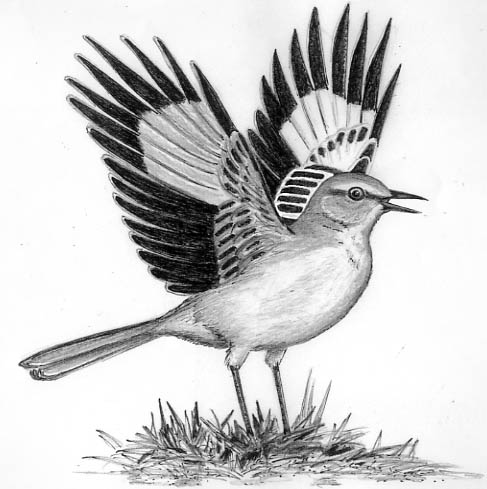
Dear Bird Folks,
Here is a question that I’ll bet you’ve never been asked before. Mockingbirds are great at mimicking the calls of other birds, but what does their real voice sound like? Do they actually have their own voice or are all of their vocalizations a copy of some other bird?
– Melissa, Avon, MA
Don’t bet, Melissa,
I wouldn’t bet that I haven’t been asked this question before. Last year a third grade school teacher asked me the same question. The question was put to her by one of her students and she came to me looking for the answer. Unfortunately, the teacher couldn’t remember the student’s name, so I wasn’t able to use it in a column until now, thanks to you. You get credit for asking the question, but it’s not a new one; therefore, you would have lost the bet. And believe me, after this last Super Bowl, I know all about losing bets. Grrr.
Even though this bird is typically found south of Canada, it is still called a Northern Mockingbird. The reason for the “northern” part of the name is that there are several species of mockingbirds living in the Americas, with the bulk of them living further south of the Northern Mockingbirds’ range. One species, the Chalk-browed Mockingbird, which looks as dull as it sounds, can be found as far south as Argentina. In fact, most mockers are fairly dull-looking. But beauty isn’t what these birds are all about. With their vast array of vocal skills mockers don’t need to waste their time on growing fancy-colored feathers. They leave the colorful stuff for the tone-deaf birds.
Like Rich Little of the last century, or perhaps Frank Caliendo of this one, mockingbirds are masters at imitating the voices of others. Some mockers have been known to incorporate several hundred different calls into their songs. Most of these calls are borrowed from other birds, but they also may imitate the sounds of barking dogs, chirping insects or squeaky doors. And we are not talking cheesy Vegas imitations here. Mockingbirds, with their little bird brains, are able to formulate superb imitations that are dead-on like the original. Mockers are quite often able to fool experienced bird watchers, who, in theory, have much larger brains. More than one birder has gone running off to see a particular bird only to come back mumbling something about a %#$%!#?! mockingbird. Even sonagrams produced by sophisticated machines can’t tell which is the original and which is the impostor. Yet, mockingbirds are rarely good enough to fool the real owners of the call, which is a good thing. The last thing a male mockingbird wants is to attract every available female wren, blackbird, or cardinal and have to explain that he likes them, but he only wants to be friends.
Even with all of their vast ability to learn many different songs, calls and sounds, mockingbirds have their limits. They don’t seem to be able to master complicated birdsongs and they may only learn simple snippets from long songs. I think mockingbirds are a lot like us in this ability. Most of us can sing short parts of many songs but, with the exception perhaps of Happy Birthday to You and One Hundred Bottles of Beer on the Wall, most us can’t sing an entire song. However, unlike us, mockingbirds don’t sing for pleasure or to help pass the time on a long bus ride. They sing to impress the ladies. A male mockingbird that sings the loudest, the longest and with the greatest variety of sounds has the best chance of attracting a mate. And let’s face it, mate attraction is much more important than passing time on a long bus ride.
The vast assortment of songs that mockers use to attract a mate are made up in part, if not entirely, of songs lifted from other sources. But in addition to their songs, mockingbirds also have an assortment of call notes, which are different from songs. Call notes are used to communicate information. Mockingbirds have series of raspy “chur” and “chuck” sounds that they use to warn of danger or to alert their chicks when they bring them food. They also have aggressive scolding sounds that they use when driving out predators or chasing away other mockingbirds that have intruded into their territory. These nonmusical sounds are probably the real voice of the mockingbird. They are specific to them and aren’t stolen from some other bird species. I guess if all you can say with your real voice is “chur” and “chuck,” it’s a good reason to imitate others. Hmm, I wonder if Rich Little has the same problem.
What a mockingbird’s real voice sounds like is a very good question, Melissa, and you shouldn’t feel that it isn’t just because a third grade kid has already asked it. Third graders are much more advanced than when I was in school. We never studied about birds back then. The only thing I remember learning in third grade was how to hold scissors, how to tie my shoes and, of course, the words to One Hundred Bottles of Beer on the Wall. I definitely don’t think I was in the advanced class.